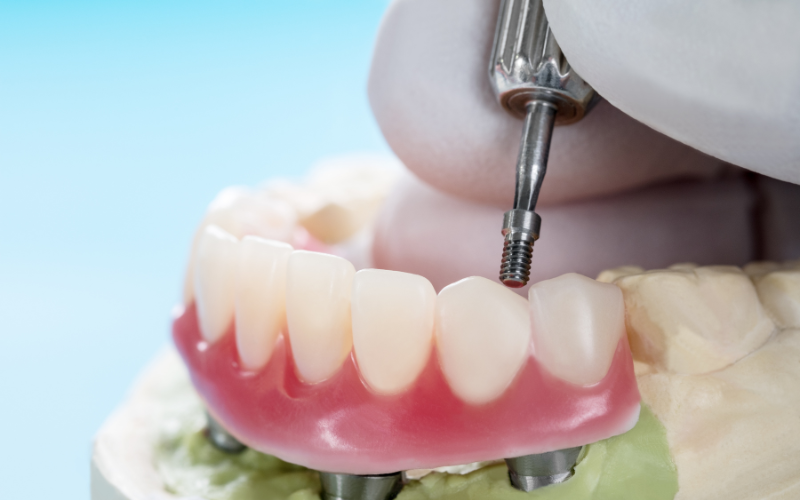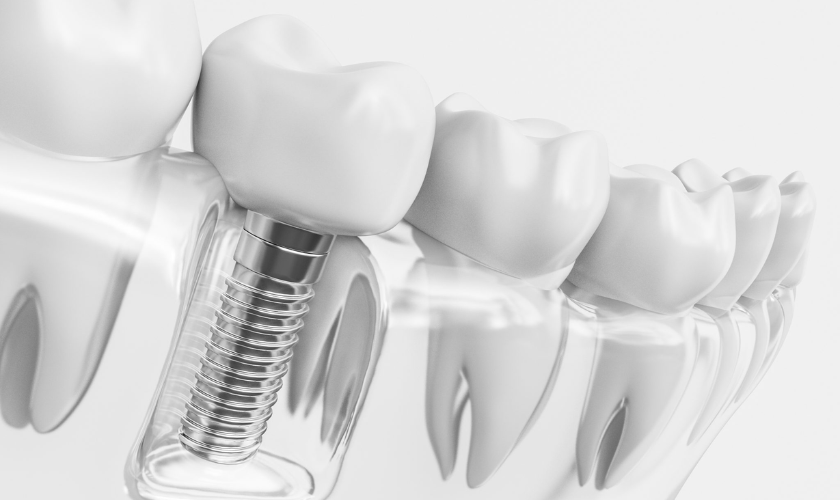717 Newfield St. Middletown, CT 06457

Undoubtedly, dental implants bring the joy of pain-free indulgence in your favorite foods while restoring the natural look and function of your teeth. At Advanced Family & Cosmetic Dentistry Middletown, we prioritize safeguarding your beautiful smile. In this comprehensive guide, we address a common patient query: “What can I eat after dental implant surgery?
The Importance of Diet for Recovery:
One of the main reasons why diet is crucial for recovery is that our bodies require specific nutrients to repair tissues and fight off infection. After dental implant surgery, the affected area will be inflamed and vulnerable to bacterial infections. By consuming a balanced diet with adequate amounts of protein, vitamins, minerals, and antioxidants, you can support your body’s immune system and promote healing.
What to Eat During Recovery:
A healthy diet should include plenty of protein, vitamins C and D, calcium, iron, zinc, and omega-3 fatty acids. These nutrients play an essential role in repairing tissues damaged during surgery as well as strengthening bones for optimal dental health.
Foods high in protein, such as lean meats like chicken or fish, can aid in wound healing by providing amino acids necessary for tissue repair. Dairy products like milk and yogurt are excellent sources of calcium that promote bone growth and strength.
Fruits rich in vitamin C, such as oranges, strawberries, kiwis, and vegetables like broccoli and leafy greens, are essential for collagen production. Collagen is a protein that helps in the formation of new tissue, which is crucial for proper healing.
Foods to Incorporate into Your Diet for Faster Healing:
Foods play a crucial role in our overall health, and this is especially true when it comes to healing and recovery after a dental implant procedure. Following a nutritious and well-balanced diet can not only aid in faster healing but also promote long-term oral health. Here are some foods that you should incorporate into your diet for faster healing after dental implant surgery:
1. Protein-rich foods:
Protein is essential for tissue repair and building new cells, making it an important nutrient for post-surgery recovery. It helps in the formation of collagen, which is necessary for wound healing. Incorporate protein-rich foods such as lean meats, fish, eggs, beans, tofu, and dairy products into your meals.
2. Vitamin C:
Vitamin C plays a vital role in boosting the immune system and promoting wound healing. It also aids in the production of collagen that supports gum tissue growth around the dental implants. Include vitamin C-rich foods like citrus fruits, kiwi, strawberries, bell peppers, broccoli, and leafy greens in your diet.
3. Omega-3 fatty acids:
Omega-3 fatty acids have anti-inflammatory properties that can help reduce swelling and pain after dental implant surgery. Foods rich in omega-3s include salmon, tuna, sardines, flaxseeds, chia seeds, and walnuts.
4. Calcium:
Calcium is crucial for maintaining strong bones and teeth as well as aiding in the formation of new bone around the dental implants during the healing process. Make sure to include calcium-rich foods such as milk, cheese, yogurt, almonds, kale, spinach, broccoli, collard greens, and fortified cereals/foods into your diet.
5. Oatmeal:
Oatmeal is a great source of complex carbohydrates that provide the energy needed by the body during recovery periods while keeping blood sugar levels under control. Oats contain zinc, which promotes wound healing. Combining oatmeal with other healthy foods such as nuts, fruits, and yogurt can make a nutritious breakfast or snack option.
6. Water:
Staying hydrated is crucial for the healing process after dental implant surgery. It helps transport essential nutrients to the surgical site and aids in flushing out toxins from the body. Make sure to drink plenty of water throughout the day and avoid sugary drinks that can hinder healing.
Foods to Avoid During Dental Implant Recovery:
While many foods can aid in the recovery process after dental implant surgery, certain foods should be avoided. These foods can irritate the surgical site or disrupt the healing process. It is important to follow your dentist’s instructions and avoid these foods for a smooth and successful recovery.
1. Hard and Crunchy Foods:
During the initial stages of implant recovery, it is best to avoid hard and crunchy foods such as nuts, chips, or hard candies. These types of food can put pressure on the implant area and cause discomfort or even damage to the surgical site. It is important to give your implants time to heal properly before reintroducing these types of foods into your diet.
2. Sticky Foods:
Sticky or chewy foods such as caramel, taffy, or gum should also be avoided during dental implant recovery. These types of food can easily get stuck around the implant area and interfere with proper healing. They may also cause unnecessary strain on the surgical site, which can delay the recovery process.
3. Spicy Foods:
Spicy foods contain capsaicin, which can irritate sensitive tissues in your mouth, including those surrounding your dental implants. This irritation can lead to discomfort and inflammation at the surgical site, hindering proper healing. It is best to avoid spicy foods during the first few weeks of dental implant recovery.
4. Acidic Foods:
Acidic fruits such as citrus fruits (oranges, lemons) and tomatoes should be limited during dental implant recovery as they can increase sensitivity in your mouth and irritate any incisions made during surgery. The high acid content in these fruits may also hinder proper healing by causing inflammation in the surgical area.
5. Avoid Alcohol & Tobacco Products:
It is essential to avoid consuming alcohol or using tobacco products during dental implant recovery. Both alcohol and tobacco have been linked to delayed healing and increased risk of infection. These substances can also cause dry mouth, making it difficult for your implants to integrate properly with the surrounding tissues.
By avoiding these foods during dental implant recovery, you can ensure a smooth and successful healing process. Be sure to follow all post-operative instructions provided by your dentist and maintain a healthy diet to promote proper healing of your dental implants if you have any concerns or questions about what food to eat.
Maintaining good oral hygiene during the recovery period is essential. Your dentist near your location will provide you with specific instructions on how to care for your dental implant site, and it is important to follow them diligently. This may include avoiding brushing or flossing around the surgical area, using a special mouthwash, and avoiding hard or crunchy foods that can irritate the site.




